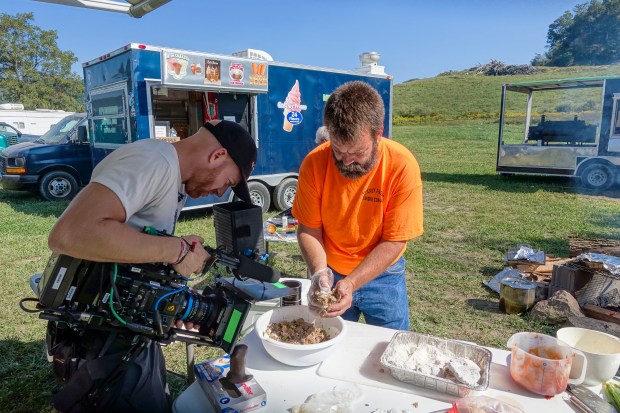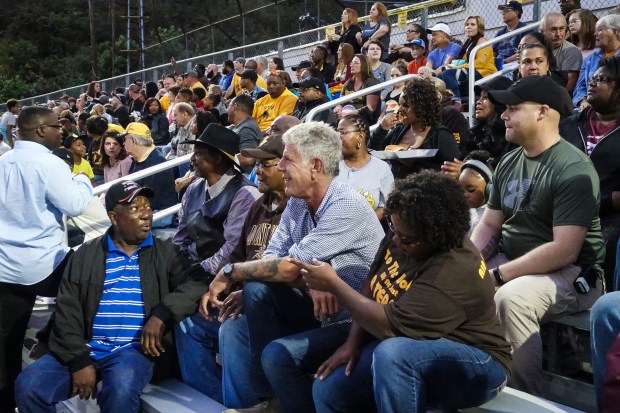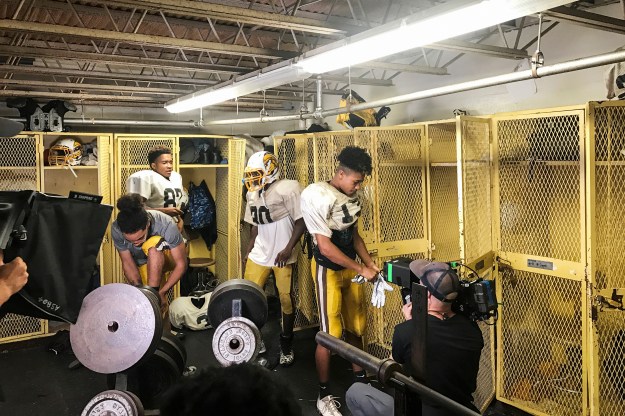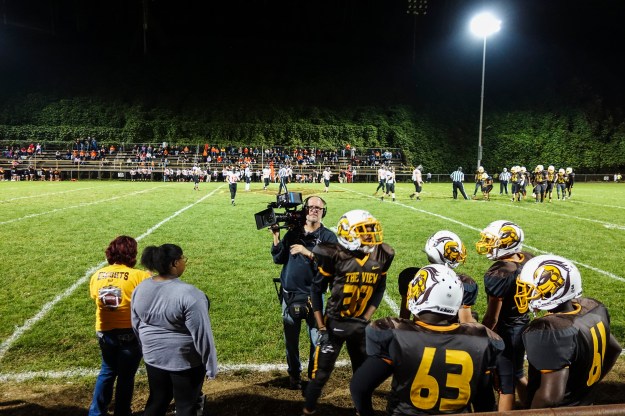Each week stand-up comedian Jennifer Neal and Roads & Kingdoms co-founder Nathan Thornburgh will rehash the previous night’s episode of “Parts Unknown.” This week, Tony traveled to West Virginia. Jennifer and Nathan talk about eating squirrels, shooting pumpkins, and the excitement of Friday night lights.
Nathan Thornburgh: Jennifer Neal. What did you think about this episode?
Jennifer Neal: I was like, don’t know why I moved to Berlin. I really feel like West Virginia has got something going on. It also made me feel like I had been missing out by not trying wild rabbit before. I mean, I’ve had squirrel, I’ve had possum. I haven’t had turtle. And wild rabbit was looking delicious. That was looking …
Thornburgh: Wait—in terms of the small furry things that one might eat, I would think rabbit would be the gateway drug, the first one to get you to possum and then squirrel, right? But you went straight to the squirrel.
Neal: I guess that depends on where you come from. I am very Southern and I am quite black. We just skipped over that gateway and went straight for the heroin version of backyard critters.
What did you think of the episode?
Thornburgh: It’s always such a trip to think about all the places that Tony goes and see that—as he pointed out—600 miles away from Manhattan you have a place that may well be as foreign as anywhere he’s been. It’s not necessarily his comfort spot, and that’s what made [West Virginia] a very interesting choice, particularly to be the opener of the season.
They start the episode with football speech in the locker room. I don’t know what your response, as an African-American, was but my first thought was that there were many more black people than I thought would be in a West Virginia show.
Neal: What did you imagine?
Thornburgh: All the good stuff from the episode—all the gun shooting, all the, “Who wants to blow up some pumpkins?”—but only white people. But then we went to McDowell County, and it’s a had a lot of African American presence. It’s still 10 percent African American, which is just below the national average.
There are these little moments in the episode—like the shot of an older white guy and this young, non-white kid doing some sort of jig together on the street—that subvert that us-versus-them feeling.
Neal: I think the North is infinitely more segregated than Appalachia because you also have issues of class involved, whereas in Appalachia, you have a lot more—let’s be honest—poverty. They’re dealing with the exit of coal and fossil fuels, and they have a much more tight-knit community because class is much less of a factor. You see a lot more of that integration.
Thornburgh: I feel, with many of these episodes, this show is just a mirror for me to look upon my own ignorance. Behold, you know nothing.
What was your favorite meal?
Neal: There were two things that really stuck out to me, as a flagrant foodie and an unapologetic eater, and one of those things was [Linda McKinney’s] spaghetti pizza. I was like, “You know what? I would hit that.” It’s two of my favorite things in the world: pizza and pasta. And I never thought about combining the two.
Making the pilgrimage to West Virginia for her spaghetti pizza.
Thornburgh: One of the things that was cool about that meal, was that she was featured in an article in the Bluefield Daily Telegraph where she talks about the experience of getting the call from the producers. She was nervous and basically slowly got talked into it. Everybody there was wary of being involved in a media production in McDowell county because I think they’ve seen that play out before, and usually they feel thrown under the bus. The other issue she had, as the Bluefield Daily Telegraph puts it, were some concerns for Tony because, as she said, “He does have some ‘language’ at times, and we don’t curse in the house.”

Neal: I liked her. She was reining him in.
Thornburgh: People think of Tony for his very sharp opinions on television or Twitter or whatever, but one of his main principles is just, “Be a good guest. Shut your mouth, listen, finish all your food.” The other thing that I loved about this article was that she told the reporter that she and Tony had a private conversation on the back porch.
Neal: What did they talk about?
Thornburgh: What do you think they talked about?
Neal: I bet he cursed a lot. He probably said, “Let me turn my mic off for a second—That is the best motherf***ing spaghetti pizza I’ve ever had.”
Thornburgh: After that meal, I think next scene that was interesting to me was the school scene. He doesn’t look super comfortable in a sea of styrofoam with the little milk cartons and kids—you can tell that’s not his natural environment—but I respect that.
Neal: He’s definitely a fish out of water in these scenes. I’m not used to seeing him look as out of place as he does. In Italy, he’s just like, “Oh, I’m just like hanging out, chilling with my homies.” But in West Virginia, let’s be honest, he stuck out like a sore thumb. And people loved him for it. I think they were quite pleased that he just met them on their level and put his foul language aside and dug deep in some deep-fried rabbit and went to some football.
This is what I like about Bourdain, is that he is an older, very well known, very well respected white man. And I like when he uses his privilege to ask people questions. People seemed very receptive to discussing politics with him. Didn’t change their minds, and it made me cringe a little bit because I’m very pro gun control, and I have been for a very, very long time, and seeing him pick up a fully automatic rifle—all my liberal blood just ran cold in my veins.
Thornburgh: I can identify with some of that. When I was working at Time magazine, part of my beat was the libertarians. I spent a lot of time with people who very much were doing these things. Fact: I had, as my Facebook profile picture, for a long time, a photo of me shooting an Uzi in the desert in Nevada with a pawnshop owner.
Neal: Nathan Thornburgh! I do not know you at all. Who are you?

Thornburgh: Sometimes people are telling you things that are just a little bit nuts, and you’re just listening and recording and trying to communicate the way that they see things, and that’s just one way of approaching it and you can’t really have that in-the-moment fact check. But it does make you a little bit complicit in those conversations, right?
I’m interested to see how the politics of this episode play out—whether people accuse Tony of not pushing back enough. There were, obviously, editorial decisions made in this episode to go from those guys who make delightful modifiers for machines of war to those absolutely brutal 10-second clips from Las Vegas and Parkland. That’s an editorial choice that the people who are featured in that scene may see as tendentious. I’m sure they would look at that and think, “Well, of course you’re going to try to connect my innocent bump-stock business or whatever with some infamous slaughters.”
Neal: But I had to ask myself when I was watching that segment—do you think there’s anything that could be said to these gun owners, who are very protective of their Second Amendment rights, to convince them otherwise?
Thornburgh: I think to his credit, Tony did say a couple things about founding fathers not envisioning these weapons. But my issue is more about giving them oxygen and normalizing their point of view so that regular folks who don’t blow up decorative gourds on the weekend would think, “Oh, well, that’s kind of strange,” instead of, “Yeah, that’s just what it means to be American, to have like massive machines of war and blow shit up on a property.” Right?
It’s more about the airtime that you give those ideas now. The Parts Unknown watcher, which we know, at least from our interactions through Explore Parts Unknown, is a very diverse group politically and age-wise, but I don’t think Tony’s going to be pushing the gun conversation one way or the other.
Neal: No.
Thornburgh: And like you were saying, using his status as a white man of a certain age with this great, big platform, he has to have some of these conversations. That’s a very big positive, and I think that’s clearly why they made this the first episode: they can see that this is a positive or a necessary conversation to have. And it’s great that he dug into it.
F*** it, we can quibble about whether they gave too much air time. There was also that one guy in the bar who—
Neal: The former military guy?
Thornburgh: Yeah. That guy is just a troll. I could have done without him in this episode.
Neal: I really wanted to punch him in the face. I’m a nonviolent person, but I make exceptions.
Thornburgh: He didn’t strike me as an avatar for regular civilian conservatism.
Neal: No.
Thornburgh: He seems like one of these guys who’s just online just straight up trolling people all the time. Not my favorite sidekick. I’d much rather go with your genuine gun lovers and so on.
Neal: He strikes me as somebody who seeks out people to have arguments with to justify his own belief in things—somebody who is constantly in the comments section of articles that have nothing to do with him.
Thornburgh: Yes. I hadn’t talked to Tony or the producers about this episode, but you do wonder—are they trying, by bringing that guy on, to make a point? For better or worse, that is the face of Trumpism. It’s not really driven by socially conservative grandmas. It seems to be driven by these insane culture warriors.
And listen, the context also has to be said. Somebody went into a Waffle House here in Nashville last week with an AR-15 and just started murdering black people. And that’s not the first time this has happened in the very recent past. It’s really hard to have this dispassionate feeling about some of these conversations because there’s actual racially motivated murder happening all over the place. We’ve gone past the bounds of, “Well, every opinion should be heard out on some level.”
Neal: Exactly. We have the paradox of tolerance for a reason, and if you give a platform to certain people to espouse intolerant views, then you have the right to not tolerate them. I wasn’t feeling that.
Thornburgh: All right. Moving from those things, I was a big fan of Lola, the squirrel hunter, and her buddy.
Neal: Yes. That was cool.


Thornburgh: Now, correct me if I’m wrong. I don’t think they actually got a squirrel, right? I think they used a stunt squirrel.
Tony somehow has this unbreakable pox on hunting and fishing. If you take him out to hunt—maybe it’s because the cameras are making giant whirring noises all the time, I don’t know what it is—but he just never seems to actually bag what they’re looking for.
Neal: Have you ever eaten squirrel before?
Thornburgh: I don’t think I’ve eaten squirrel or possum.
Neal: It’s really good in a cream sauce.
Thornburgh: What’s the flavor?
Neal: It’s a little bit gamey.
Thornburgh: We’re getting close to the end here. There was Act Five, which I immediately took to be the Brooklyn act. Lost Creek Farm owners Mike Costello and Amy Dawson seemed like very nice people who could be living in Greenpoint, with their heritage ciders.
Neal: Right? They were giving their local food and drink a more modern take. The way they were explaining it, I almost expected them to put some crème fraiche up on that rabbit. It was really refreshing. They were doing the salt basting with the herbs on top—there was some artistry to the way they prepared food and drink. And the love that they put into it, I thought was just quintessential Appalachia southern. It was beautiful.
Thornburgh: Ah, that’s nice. Okay, Friday night lights. What did you think about that?
Neal: Full disclosure: I’m not a football fan, never been a football fan, ain’t never going to be a football fan ever. But it had this … my God, I’m rooting for you. I really want you to win this game. You need this, I need this, we all need this right now. We need to believe in something, because the world is a dark, dark place, kind of thing. But there was something moving and just warm about that scene at the end. Sure, these kids are running their butts off, and the coach was not friendly about it at all. He he let them know how he was thinking that whole game. But the scene at the end, where everybody’s grabbing each other and holding each other, and they’re really happy and they have these big old smiles on their faces—it made me wish I was back in high school, to be honest. I feel like my adult life will never be that fun or exciting.
Thornburgh: You’ll never have something to root that hard for?
Neal: Never.
Thornburgh: Oh, man.
Neal: That took a dark turn. You tell me how you feel.
Thornburgh: It’s all downhill from here.
Neal: Enjoy it while it lasts, kids.
This conversation has been edited and condensed.